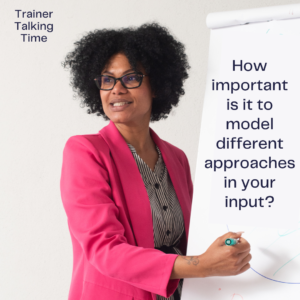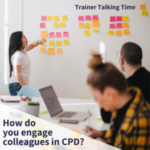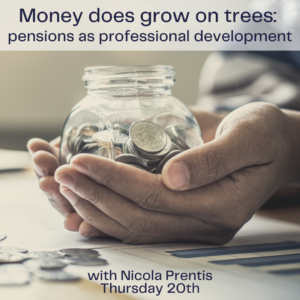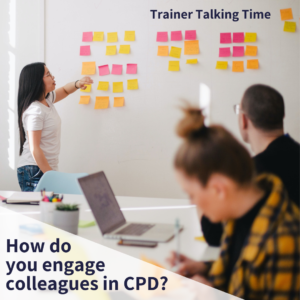As always, I’ve tried to group the thoughts which came up into different threads and there are lots of questions in there to reflect on. In the session on Monday, we chatted quite a bit about the lack of focus on one-to-one teaching on pre-service qualifications, despite the fact that this is an important source of income for many teachers and requires a different approach than group teaching. This led onto a discussion about Dogme and the benefits and potential drawbacks of using it in one-to-one teaching. Across the two sessions, we also touched on what approaches are popular in teaching other languages and queried the research available to those teachers. I think one of my favourite quotes from the session, from Tracey, was
If you’re passionate about the approach you’re using, it will work.
One-to-one teaching
How much focus is placed on teaching a single student in pre-service qualifications (or higher-level qualifications)? On the Trinity CertTESOL, there is an assignment in which prepare a lesson and study plan for an individual learner. In module 3 on the Cambridge DELTA, there is the option to focus more on one-to-one teaching. Could training courses reflect the way ELT is developing – even the DipTESOL still requires 8 minimum in their classes for teaching practice. We often teach as we were taught, rather than preparing people for their future.
Preparing teachers for working one-to-one would also give the profession that level of professionalism – preparing teachers to be better able to do different things and not just being thrown into it because of what’s on the market (similarly to YLs).
Even just working with two people instead of one is very different.
Setting expectations and objectives may be trickier with one-to-one students – do we often ‘level down’ to the pace of the learner, particularly if they come along having had a busy day? It’s much easier to get sidetracked.
And breaking the ‘power gap’ – not always being in a position where the teacher has the ‘power’ and leads the conversation or asks questions.
Other languages or other subjects
Teaching languages is not 100% transferable skills (you can teach English, but can you teach French?). What literature is there for German / Spanish / Japanese as a foreign language?
Berlitz follows a Direct Method which they have transferred to teaching other languages.
Visible Learning, John Hattie – according to research, there are effective things we should be doing in every lesson for success. Can we say learning languages is the same as learning other languages? If there is criteria for success, do we need to limit our scope to encourage success? No – we need variety and to know what learners want (preference as well as effectiveness).
For teachers teaching in mainstream education, it can be a very different context to ELT. Lisa mentioned she felt there were lots of benefits to having done a languages PGCE, there was an emphasis on using the L2 in the lesson and a lot of deliberate thought went into that as for teachers it was often their L2 as well. The PPP approach was mainly used in that context. Communicative Language Teaching (ELT) runs rings around other approaches because we can see how effective and wide-reaching it is.
Another challenge is the mix of levels in a class – in mainstream education in the UK, learners tended to have a similar level and were starting from the same point. But in ELT and mainstream education with English, there can be a huge range of levels within a class.
Focus on Dogme
Dogme – a logistical difficulty of incorporating it in a pre-service course. How do you get the why across to them? The benefits of breaking out of what you’re doing and focusing on the learners’ needs is so important – how can we help teachers to follow this route without it being just a conversation or winging it? How do teachers get the familiarity with the language to do Dogme effectively? How do we decide what grammar is ‘difficult’ for learners? Do teachers need to have a good grasp of the CEFR or can they be responsive to what learners are really looking for (even if it seems to be beyond or below their level)? The main names behind Dogme (Thornbury, Meddings, Gaughan) have many years of experience behind them before starting Dogme.
Until you have experience working with different learners of the CEFR, it’s very difficult to know what they ‘should’ know at different points. What are they expected to have good control / grasp of at different points? Perhaps they don’t have a good enough grasp of X in order to be able to do Y, which is what they want to do. What is the big picture in Dogme – how do learners review and revisit language? Is there a sense of structure / progress?
Student motivation – does it work better for some learners? How effective is it? Some learners are motivated by those small steps – will they feel that sense of progress with a Dogme approach? Learners bring certain expectations of what lessons should be like – will some learners be more responsive to another approach (e.g. PPP) if it ties more closely to how they’ve been taught in the past? Do learners worry about words in isolation (e.g. did) but feel comfortable with chunks (What did you do yesterday?)?
A different approach of teaching monolingual vs multilingual and groups vs individuals. Pre-service qualifications are very much focused on working with groups and the techniques you’re shown and classroom management techniques are much more group-focussed. Dogme allows for this more individualised approach.
IH Journal – Lisa’s Action Research on Dogme. https://ihworld.com/ih-journal/issues/issue-34/dogme-a-teacher-s-view/
Demand High ELT (Scrivener and Underhill) also had some ideas on how to incorporate other approaches to get the most out of a coursebook activity, which can be responsive to students’ needs.
Other aspects of teacher development
International House Teachers’ Portal – Adrian Underhill Improvisation and including it on pre-service qualifications. Knowledge of how to deal with difficult questions, makes you feel more confident.
Interactive observation – fab idea to have a lesson by a tutor that could be stopped for trainee teachers to reflect on what they just saw (much more immediate than at the end of the hour). InnovateELT has demos lessons where participants chat to teacher and learners afterwards. Record a lesson and watch it alongside a trainer who can pause and ask questions – what were you thinking at that point? Reflects more immediate feedback.
Reflecting on the lesson – what could you have done differently (not necessarily in a negative way, but to raise awareness of different approaches.) Informed reflection – reading around the research / theory as well as having your own personal experiences. Also asking the learners about their experiences: what did you most enjoy in the lesson? what’s one thing you learnt?












